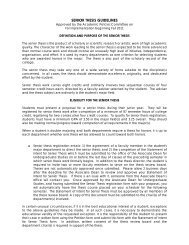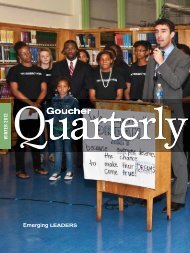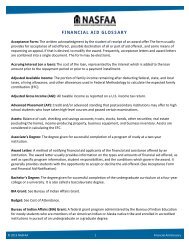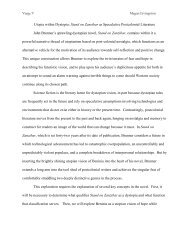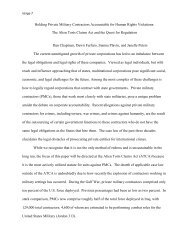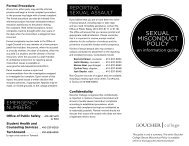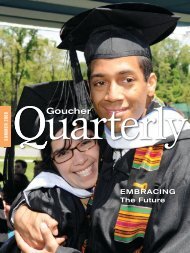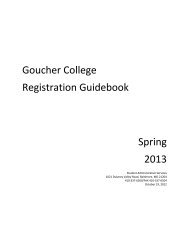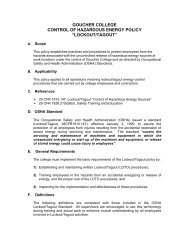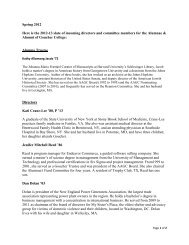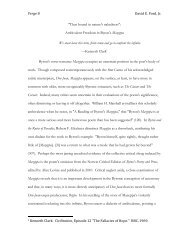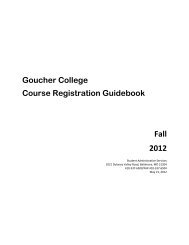Abraham Lincoln and the Northern Anti-War Press
Abraham Lincoln and the Northern Anti-War Press
Abraham Lincoln and the Northern Anti-War Press
Create successful ePaper yourself
Turn your PDF publications into a flip-book with our unique Google optimized e-Paper software.
Verge 6<br />
Daniel Wer<strong>the</strong>imer<br />
<strong>Abraham</strong> <strong>Lincoln</strong> <strong>and</strong> <strong>the</strong> Nor<strong>the</strong>rn <strong>Anti</strong>-<strong>War</strong> <strong>Press</strong><br />
In present day America, <strong>the</strong>re is still great concern for <strong>the</strong> preservation of <strong>the</strong> freedom of<br />
speech <strong>and</strong> <strong>the</strong> freedom of <strong>the</strong> press. Recent controversial incidents include <strong>the</strong> incarceration of<br />
journalist Judith Miller for refusing to reveal <strong>the</strong> identities of anonymous sources, as well as <strong>the</strong><br />
revelation of a U.S. attempt to track <strong>the</strong> finances of terror groups in <strong>the</strong> pages of <strong>the</strong> NY Times in<br />
2006. Both of <strong>the</strong>se examples illustrate <strong>the</strong> continuing rift between <strong>the</strong> U.S. government <strong>and</strong> <strong>the</strong><br />
American media.<br />
There seems to be a pervasive belief that we live in a country with a rich heritage of<br />
respecting <strong>the</strong> freedom of <strong>the</strong> press. In fact, a thorny relationship has existed between press <strong>and</strong><br />
state since <strong>the</strong> founding of America. Just a decade after <strong>the</strong> ratification of <strong>the</strong> Constitution,<br />
President John Adams signed into law <strong>the</strong> Sedition Act, making it a crime to publish material<br />
that was overly critical of <strong>the</strong> president or ei<strong>the</strong>r house of Congress. From its very beginning,<br />
America has experienced incidents such as <strong>the</strong> Sedition Act that have threatened <strong>the</strong> freedom of<br />
speech, <strong>and</strong> in particular, <strong>the</strong> right of <strong>the</strong> press to freely express itself.<br />
Among <strong>the</strong> most notable episodes in <strong>the</strong> history of <strong>the</strong> American press was <strong>the</strong> <strong>Lincoln</strong><br />
Administration‟s treatment of <strong>the</strong> anti-war Nor<strong>the</strong>rn newspapers during <strong>the</strong> Civil <strong>War</strong>. Fa<strong>the</strong>r<br />
<strong>Abraham</strong>, as his most admiring supporters refer to him, is widely considered to be one of our<br />
greatest presidents. His extraordinary popularity is likely <strong>the</strong> reason that many of his<br />
administration‟s controversial actions are seemingly glossed over. These questionable measures<br />
include excluding newspapers from <strong>the</strong> public mail, <strong>the</strong> confiscation of newspapers, <strong>the</strong> arrests<br />
of publishers <strong>and</strong> editors, <strong>and</strong> <strong>the</strong> censorship of telegraphic messages. Though all of <strong>the</strong>se
Verge 6 Wer<strong>the</strong>imer 2<br />
measures may well be both constitutional <strong>and</strong> justifiable, it is of <strong>the</strong> utmost importance that all<br />
government actions of this nature be heavily scrutinized.<br />
The <strong>Lincoln</strong> administration‟s most earnest attempts at suppressing anti-war sentiment in<br />
<strong>the</strong> North were preceded by a wave of violent attacks against newspapers that harbored critical<br />
opinions of <strong>the</strong> war. This civil unrest was caused by a convergence of two factors: <strong>the</strong><br />
homecoming of Nor<strong>the</strong>rn soldiers after a three-month tour of duty, <strong>and</strong> growing doubt <strong>and</strong><br />
uneasiness surrounding <strong>the</strong> war efforts after <strong>the</strong> Union‟s defeat at Bull Run (<strong>the</strong> First Battle of<br />
Manassas). The harsh criticism of <strong>the</strong> press was not only directed at politicians in Washington,<br />
but also at <strong>the</strong> local returning soldiers. Incidents of lawlessness quickly spread across <strong>the</strong> North<br />
in <strong>the</strong> summer of 1861 (Sprague 129).<br />
The first paper targeted by angry mobs was <strong>the</strong> Democratic St<strong>and</strong>ard of Concord, New<br />
Hampshire. On August 8 th , a crowd led by former soldiers broke down <strong>the</strong> door of <strong>the</strong> paper‟s<br />
office <strong>and</strong> began destroying everything in sight. Though <strong>the</strong> desks <strong>and</strong> o<strong>the</strong>r belongings of <strong>the</strong><br />
paper were burned on <strong>the</strong> sidewalk, <strong>the</strong> publishers escaped with <strong>the</strong>ir printing presses intact<br />
(Sprague 129-133).<br />
The Bangor Democrat was not so fortunate when it was targeted just several days later.<br />
The offices of editor Marcellus Emory were so thoroughly demolished that <strong>the</strong> paper was unable<br />
to resume publication. Emory would later say of <strong>the</strong> incident, “thus hath <strong>the</strong> freedom of <strong>the</strong> press<br />
been stricken down here in Maine” (Sprague 134).<br />
One of <strong>the</strong> worst examples of Nor<strong>the</strong>rn mob violence took place on August 19 th . That<br />
night in Haverhill, Massachusetts, a large crowd dragged Ambrose Kimball out of his house.<br />
Kimball, <strong>the</strong> editor of <strong>the</strong> local Essex County Democrat, was tarred <strong>and</strong> fea<strong>the</strong>red at <strong>the</strong> center of<br />
town after he refused to acknowledge that he should not have published his criticism.
Verge 6 Wer<strong>the</strong>imer 3<br />
Thoroughly embarrassed, he was made to repeat a lengthy apology in front of <strong>the</strong> crowd: “I am<br />
sorry that I have published what I have, <strong>and</strong> I promise that I will never again write or publish<br />
articles against <strong>the</strong> North <strong>and</strong> in favor of secession, so help me God” (Sprague 135).<br />
The violence continued through <strong>the</strong> end of August, <strong>and</strong> a breaking point was reached<br />
when prominent newspapers in New York City were threatened with violence. Publications that<br />
supported <strong>Lincoln</strong> <strong>and</strong> his war called for an end to <strong>the</strong> mob violence, but not because of <strong>the</strong>ir<br />
support for <strong>the</strong> freedom of <strong>the</strong> press. Instead, <strong>the</strong>se papers called on <strong>the</strong> federal government to<br />
suppress anti-war sentiment ra<strong>the</strong>r than <strong>the</strong> public. The New York Times stated this view<br />
explicitly: “If <strong>the</strong>se newspapers are to be suppressed, let it be done by virtue of public law, <strong>and</strong><br />
not by reckless violence…If <strong>the</strong>ir continued existence puts <strong>the</strong> Government in peril, let it be<br />
arrested; but let it be done by <strong>the</strong> law <strong>and</strong> its agents <strong>and</strong> not by a mob” (Sprague 140).<br />
The <strong>Lincoln</strong> administration‟s response would undoubtedly be highly consequential. On<br />
<strong>the</strong> one h<strong>and</strong>, if it did nothing, <strong>the</strong> violence would continue <strong>and</strong> likely intensify. Any attempt by<br />
<strong>the</strong> administration to protect publishers <strong>and</strong> allow <strong>the</strong>m to publish <strong>the</strong>ir critical editorials would<br />
be massively unpopular, <strong>and</strong> <strong>the</strong> government would lose <strong>the</strong> backing of its strongest supporters.<br />
However, if it followed <strong>the</strong> advice of <strong>the</strong> NY Times <strong>and</strong> dealt with Nor<strong>the</strong>rn dissent, <strong>the</strong> <strong>Lincoln</strong><br />
administration would need to take extraordinary measures that were <strong>the</strong>n unprecedented in<br />
American history. As Dean Sprague explains in his book Freedom Under <strong>Lincoln</strong>, “any action by<br />
<strong>the</strong> federal government [to suppress anti-war sentiment] would require a radical readjustment in<br />
<strong>the</strong> balance of power between <strong>the</strong> states <strong>and</strong> <strong>the</strong> federal government” (Sprague 140).<br />
The <strong>Lincoln</strong> administration began its campaign against critical newspapers in New York<br />
City, where <strong>the</strong> largest paper in <strong>the</strong> city, <strong>the</strong> Journal of Commerce, as well as <strong>the</strong> New York Daily<br />
News, both distributed <strong>the</strong>ir anti-war articles to newspapers across <strong>the</strong> country to be reprinted.
Verge 6 Wer<strong>the</strong>imer 4<br />
Montgomery Blair, <strong>the</strong> Postmaster General, sent out an order for <strong>the</strong> city‟s anti-war papers to be<br />
excluded from <strong>the</strong> mails. This measure had a devastating effect on <strong>the</strong> targeted publications.<br />
“Almost <strong>the</strong> entire distribution of newspapers in 1861 was done through <strong>the</strong> mail.” Denying <strong>the</strong><br />
papers access to <strong>the</strong> mail “very clearly meant <strong>the</strong>ir end” (Sprague 144).<br />
The h<strong>and</strong>ful of newspapers affected by <strong>the</strong> government‟s order responded in differing<br />
ways. In <strong>the</strong> case of <strong>the</strong> Journal of Commerce, owner <strong>and</strong> editor Gerard Hallock had written <strong>the</strong><br />
editorials that enraged <strong>the</strong> government. As Hallock would later state, he could not “contend with<br />
<strong>the</strong> government” <strong>and</strong> <strong>the</strong>refore entered into negotiations with <strong>the</strong> authorities. He agreed to sell<br />
his share of <strong>the</strong> paper in order to see it continue its publication. Two weeks later, <strong>the</strong> Journal<br />
resumed its distribution through <strong>the</strong> mail (Sprague 144-145).<br />
The Daily News, ano<strong>the</strong>r of <strong>the</strong> opposition papers excluded from <strong>the</strong> mails, was owned by<br />
NYC congressman Ben Wood, whose bro<strong>the</strong>r, Mayor Fern<strong>and</strong>o Wood, had previously proposed<br />
that <strong>the</strong> city of New York secede from <strong>the</strong> Union. Ben Wood attempted to combat <strong>the</strong><br />
government‟s measure by using private delivery services to send copies of <strong>the</strong> paper West <strong>and</strong><br />
South where <strong>the</strong>re was more anti-war sentiment. The federal government countered this move by<br />
ordering that all copies of <strong>the</strong> paper throughout <strong>the</strong> country be seized <strong>and</strong> confiscated. The extent<br />
of <strong>the</strong> government‟s vigilance was such that “one newsboy in Connecticut was arrested <strong>and</strong> sent<br />
to prison for selling [copies of <strong>the</strong> Daily News].” Wood ultimately realized that <strong>the</strong> paper was<br />
doomed to financial ruin <strong>and</strong> he had no choice but to cease publication. He poignantly noted that<br />
<strong>the</strong> papers were “confiscated by Government officials, acting without warrant or process of law”<br />
(Sprague 146).<br />
Many newspaper editors were unable to look past <strong>the</strong> politics of <strong>the</strong> moment <strong>and</strong> rejoiced<br />
in <strong>the</strong> fate of <strong>the</strong> Daily News. As Sprague relates, “James Gordon Bennett‟s Herald was
Verge 6 Wer<strong>the</strong>imer 5<br />
„gratified to announce‟ <strong>the</strong> death of <strong>the</strong> paper. The New York Times added that Ben Wood should<br />
be thankful he could „walk <strong>the</strong> streets with as much impunity as if he were a true man‟” (Sprague<br />
146). These reactions were commonplace after <strong>the</strong> downfall of a paper. Sprague notes that “even<br />
<strong>the</strong> country‟s leading editors refused to rise in defense of <strong>the</strong>ir stricken comrades” (Sprague 153).<br />
Daybook was <strong>the</strong> third NY paper targeted by <strong>the</strong> federal government. The paper‟s<br />
ownership offered to cease any discussion in its pages of <strong>the</strong> merits of <strong>the</strong> war, <strong>and</strong> devote itself<br />
entirely to discussing <strong>the</strong> issue of slavery in America, renaming itself <strong>the</strong> Weekly Caucasian. The<br />
government‟s response to this proposal is noteworthy. “Since <strong>the</strong> war in 1861 was not being<br />
fought on <strong>the</strong> question of slavery but to preserve <strong>the</strong> Union, <strong>the</strong> request was approved” (Sprague<br />
146-147). And so <strong>the</strong> Daybook transformed itself to regain its ability to circulate.<br />
Though many publishers capitulated to <strong>the</strong> government‟s dem<strong>and</strong>s without much fuss, a<br />
select few were more stubborn. James McMasters, editor <strong>and</strong> publisher of <strong>the</strong> Freeman’s<br />
Journal, countered <strong>the</strong> government‟s ban of his paper from <strong>the</strong> mail by downsizing <strong>the</strong><br />
publication to reduce <strong>the</strong> cost of running it. Ultimately, a copy of <strong>the</strong> paper was sent to William<br />
Seward, Secretary of State at <strong>the</strong> time <strong>and</strong> former Governor of New York. His response was<br />
swift <strong>and</strong> curt: “You will arrest <strong>and</strong> send [McMasters] to Fort Lafayette” (Sprague 147-148).<br />
McMasters was arrested without a warrant <strong>and</strong> remained in prison for over a month.<br />
James McMasters was but one of many citizens arrested in 1861 without due process of<br />
law. Earlier in <strong>the</strong> year on April 19 th , riots erupted in <strong>the</strong> city of Baltimore. The outburst was<br />
sparked by <strong>the</strong> passage of a regiment of Nor<strong>the</strong>rn soldiers through <strong>the</strong> city. When <strong>the</strong> news of <strong>the</strong><br />
riots reached Washington, <strong>the</strong> administration became nervous that it would lose control of a city<br />
with such strategic importance. If <strong>the</strong> Confederates were to take over <strong>the</strong> city, <strong>the</strong>y could cut off
Verge 6 Wer<strong>the</strong>imer 6<br />
railroad shipments to <strong>the</strong> capital. Nor<strong>the</strong>rn soldiers were dispatched to regain control of<br />
Baltimore.<br />
However, <strong>Lincoln</strong> believed it was necessary to respond more boldly, <strong>and</strong> on April 27 th he<br />
unilaterally suspended Habeas Corpus. Dean Sprague provides <strong>the</strong> following analysis: “By this<br />
action he declared war on his enemies as he had, by calling up <strong>the</strong> militia after Fort Sumter,<br />
declared war on his enemies in <strong>the</strong> South” (Sprague 25). And yet, as more soldiers poured into<br />
<strong>the</strong> state of Maryl<strong>and</strong> from <strong>the</strong> North, <strong>the</strong> administration felt at greater ease, <strong>and</strong> <strong>the</strong>re were not<br />
many arrests made after <strong>the</strong> initial suspension of <strong>the</strong> writ.<br />
The outbreak of what Sprague calls a “mania for arrests” (Sprague 151) did not occur<br />
until later in <strong>the</strong> year, shortly after <strong>the</strong> incarceration of James McMasters. As Secretary Seward<br />
widened his attempt to suppress anti-war sentiment to <strong>the</strong> rest of his home state, Simon<br />
Cameron, <strong>Lincoln</strong>‟s short-lived Secretary of <strong>War</strong>, focused his attention on his own home state of<br />
Pennsylvania. Cameron singled out Pierce Butler, a wealthy l<strong>and</strong>owner whom he knew<br />
personally, <strong>and</strong> ordered his imprisonment in Fort Lafayette. Butler was released after a month,<br />
<strong>and</strong> he <strong>the</strong>n proceeded to file suit against Cameron in Pennsylvania state court for false<br />
imprisonment. This suit was <strong>the</strong> first of its kind, <strong>and</strong> <strong>the</strong> precedent it could have potentially set<br />
frightened Cameron <strong>and</strong> <strong>the</strong> rest of <strong>the</strong> administration. However, Butler ultimately dropped his<br />
suit (Sprague 151).<br />
On <strong>the</strong> night of August 22 nd , a series of incidents took place in an effort to suppress<br />
opposition papers. The evening began with <strong>the</strong> seizure of copies of New York‟s Daily News from<br />
a train headed south to Baltimore <strong>and</strong> Washington. Later that night, soldiers arrested Amasa<br />
Converse, editor of <strong>the</strong> Christian Observer, <strong>and</strong> took possession of his paper‟s office. And still<br />
later, <strong>the</strong> printing shop of <strong>the</strong> Jeffersonian was seized (Sprague 152).
Verge 6 Wer<strong>the</strong>imer 7<br />
Even politicians were not protected from <strong>the</strong> wrath of <strong>the</strong> <strong>Lincoln</strong> administration. Mayor<br />
Berrett of Washington D.C. was also arrested <strong>and</strong> sent to Fort Lafayette. A known Sou<strong>the</strong>rn<br />
sympathizer, Berrett refused to take <strong>the</strong> oath of allegiance as was expected of him upon being<br />
appointed to <strong>the</strong> Washington Board of Police Commissioners. Berrett claimed he had already<br />
sworn his allegiance in his capacity as mayor, <strong>and</strong> that it was <strong>the</strong>refore unnecessary for him to<br />
take <strong>the</strong> oath again. However, Attorney General Bates thought o<strong>the</strong>rwise, <strong>and</strong> Berrett was<br />
imprisoned. In order to be released, he stepped down from his position as mayor (Sprague 154-<br />
155).<br />
One of <strong>the</strong> more interesting anecdotes from this period involves <strong>the</strong> arrest of Baltimore<br />
resident Francis Key Howard, gr<strong>and</strong>son of Francis Scott Key. Key Howard was incarcerated for<br />
publishing anti-war articles in <strong>the</strong> paper he edited. While imprisoned, he wrote to Seward<br />
dem<strong>and</strong>ing his immediate release, refusing to appear before a military tribunal or apologize for<br />
his actions (R<strong>and</strong>all 504). The most remarkable detail is that Francis Key Howard was arrested<br />
without a warrant or charges brought against him <strong>and</strong> sent to Fort McHenry, <strong>the</strong> exact place<br />
where his gr<strong>and</strong>fa<strong>the</strong>r composed “The Star Spangled Banner” (DiLorenzo 133).<br />
The <strong>Lincoln</strong> administration began its campaign against <strong>the</strong> press earlier in 1861, albeit in<br />
a more subtle manner. In April of that year, <strong>the</strong> government began to censor telegraphs leaving<br />
Washington. Among <strong>the</strong> messages excluded were<br />
communications giving military information, <strong>and</strong> also those which were deemed<br />
to convey too much news concerning <strong>the</strong> activities of <strong>the</strong> Government. Reports of<br />
delicate diplomatic questions, criticisms of Cabinet members, comments giving<br />
<strong>the</strong> mere opinion of correspondents, advance information of contemplated<br />
measures, <strong>and</strong> stories injurious of officers, were denied <strong>the</strong> wires.(R<strong>and</strong>all 482).
Verge 6 Wer<strong>the</strong>imer 8<br />
By censoring telegraphic communication, <strong>the</strong> <strong>Lincoln</strong> administration made it more difficult for<br />
Nor<strong>the</strong>rn press outlets to receive valuable information from <strong>the</strong>ir sources in <strong>the</strong> South.<br />
In due time, this program would be greatly exp<strong>and</strong>ed. On February 2 nd 1862, <strong>the</strong><br />
Congress authorized <strong>the</strong> President to supervise all telegraph lines in <strong>the</strong> United States. This<br />
undertaking was carried out by military personnel, <strong>and</strong> <strong>the</strong> <strong>War</strong> Department censored messages<br />
when necessary. “All telegraphic communications concerning military matters not authorized by<br />
<strong>the</strong> Secretary of <strong>War</strong>, or <strong>the</strong> comm<strong>and</strong>ing general of <strong>the</strong> district, were forbidden” (R<strong>and</strong>all 483).<br />
The Treasury, State, <strong>and</strong> <strong>War</strong> Departments were all in control of <strong>the</strong> lines of communication at<br />
various points during <strong>the</strong> course of <strong>the</strong> war.<br />
The various measures undertaken by <strong>the</strong> <strong>Lincoln</strong> administration to suppress anti-war<br />
sentiment were often unprecedented in American history. Scholars have grappled with <strong>the</strong>se<br />
actions in a myriad of ways. In his book Freedom Under <strong>Lincoln</strong>, Dean Sprague writes three<br />
hundred pages detailing <strong>the</strong> extraordinary ways in which civil liberties were curtailed in 1861.<br />
And yet, he concludes his work with a chapter entitled “<strong>Lincoln</strong>, The Humanitarian.” Sprague<br />
does not attempt to justify <strong>Lincoln</strong>‟s actions from a constitutional perspective but instead boldly<br />
proclaims that such measures were necessary to preserve <strong>the</strong> Union. Sprague even goes so far as<br />
to praise <strong>Lincoln</strong> for being “a man of iron who was willing to see hundreds of thous<strong>and</strong>s of<br />
young men die for <strong>the</strong> sake of <strong>the</strong> Union <strong>and</strong> not above sending a few hundred to prison for<br />
opposing <strong>the</strong> war” (Sprague 302). In Sprague‟s view, <strong>the</strong> denial of basic freedoms <strong>and</strong> <strong>the</strong> deaths<br />
of several hundred thous<strong>and</strong> Americans was apparently a reasonable price to pay for <strong>the</strong><br />
preservation of <strong>the</strong> Union.<br />
Earlier in his book, Sprague tries to distance <strong>Lincoln</strong> from some of <strong>the</strong> overt attacks on<br />
Nor<strong>the</strong>rn newspapers by asserting that members of his cabinet were largely responsible for <strong>the</strong>se
Verge 6 Wer<strong>the</strong>imer 9<br />
orders. Indeed, Secretaries Seward <strong>and</strong> Cameron played pivotal roles in <strong>the</strong> development of a<br />
strategy against opposition papers. However, later in <strong>the</strong> war, when <strong>the</strong> New York World<br />
published objectionable <strong>and</strong> likely false statements tied to <strong>the</strong> president, <strong>Lincoln</strong> personally<br />
signed a letter authorizing <strong>the</strong> use of force against that paper as well as <strong>the</strong> Journal of Commerce.<br />
On May 18 th 1864, <strong>Lincoln</strong> ordered General John Dix to “arrest <strong>and</strong> imprison…<strong>the</strong> editors,<br />
proprietors <strong>and</strong> publishers of <strong>the</strong> aforesaid newspapers…You will also take possession by<br />
military force, of <strong>the</strong> printing establishments of <strong>the</strong> New York World <strong>and</strong> Journal of<br />
Commerce…<strong>and</strong> prohibit any fur<strong>the</strong>r publication <strong>the</strong>reof” (R<strong>and</strong>all 496-497). Perhaps <strong>Lincoln</strong><br />
had little h<strong>and</strong> in some of <strong>the</strong> wartime orders, but it would seem inaccurate to say that he was not<br />
directly linked to a fair number of <strong>the</strong>m.<br />
Fur<strong>the</strong>rmore, Sprague‟s analysis of <strong>Lincoln</strong>‟s historic decision to suspend Habeas Corpus<br />
is also questionable. ”Although <strong>the</strong> Constitution provided that <strong>the</strong> privilege of <strong>the</strong> writ of habeas<br />
corpus could be suspended when „in Cases of Rebellion or Invasion <strong>the</strong> public safety may<br />
require it,‟ it was silent as to exactly where <strong>the</strong> power of suspension resided” (Sprague 25).<br />
Sprague‟s claim that <strong>the</strong>re was a lack of clarity as to which branch of government could<br />
authorize a suspension is puzzling because <strong>the</strong> passage pertaining to <strong>the</strong> suspension of Habeas<br />
Corpus is found in Article 1 Section 9 of <strong>the</strong> Constitution. This first article is concerned solely<br />
with <strong>the</strong> powers <strong>and</strong> limitations of <strong>the</strong> Legislative Branch. As such, one would logically conclude<br />
that <strong>the</strong> framers had placed this power in <strong>the</strong> h<strong>and</strong>s of Congress.<br />
James G. R<strong>and</strong>all defends <strong>Lincoln</strong> in a very different manner in his book Constitutional<br />
Problems Under <strong>Lincoln</strong>. He continually downplays <strong>the</strong> measures taken by <strong>the</strong> administration,<br />
<strong>and</strong> as such it would appear that he does not believe that <strong>the</strong>re were many Constitutional<br />
problems at all. R<strong>and</strong>all begins his assessment of <strong>the</strong> relationship between <strong>Lincoln</strong>‟s
Verge 6 Wer<strong>the</strong>imer 10<br />
administration <strong>and</strong> <strong>the</strong> press by stating that “a striking fact concerning <strong>the</strong> subject of journalistic<br />
activity during <strong>the</strong> Civil <strong>War</strong> was <strong>the</strong> lack of any real censorship” (R<strong>and</strong>all 481). Regarding <strong>the</strong><br />
censorship of telegraphic messages, he writes that “this governmental supervision of <strong>the</strong><br />
telegraph was but a feeble measure of news control” (R<strong>and</strong>all 483). R<strong>and</strong>all later adds that<br />
<strong>the</strong> continual revelation of military information by <strong>the</strong> newspapers of <strong>the</strong> Civil<br />
<strong>War</strong> period seems a shocking thing in contrast to <strong>the</strong> elaborate restrictions that<br />
were imposed for safeguarding military secrecy during <strong>the</strong> World <strong>War</strong>. Plans of<br />
campaign, movements of troops, <strong>the</strong> location <strong>and</strong> strength of military units—all<br />
such information was regularly published to <strong>the</strong> world. (R<strong>and</strong>all 485).<br />
A striking feature of R<strong>and</strong>all‟s remarks is his frequent use of relativism. There clearly<br />
were instances in which opinions were suppressed, so when R<strong>and</strong>all claims that <strong>the</strong>re was “a lack<br />
of any real censorship” during <strong>the</strong> Civil <strong>War</strong>, one cannot help but wonder, in comparison to<br />
what? When R<strong>and</strong>all states that <strong>the</strong> kind of information disseminated by <strong>the</strong> press was<br />
“shocking” compared to <strong>the</strong> lack of knowledge during <strong>the</strong> World <strong>War</strong>, he is making a criticism<br />
based on a comparison. The problem with this method of analysis is that <strong>the</strong> rights at stake (i.e.<br />
<strong>the</strong> freedom of speech <strong>and</strong> <strong>the</strong> freedom of <strong>the</strong> press) are not relative, but are instead widely<br />
thought to be absolute. They are <strong>the</strong> kind of rights Thomas Jefferson would likely refer to as<br />
“inalienable,” just as he described <strong>the</strong> right to life, liberty, <strong>and</strong> <strong>the</strong> pursuit of happiness in <strong>the</strong><br />
Declaration of Independence. <strong>Abraham</strong> <strong>Lincoln</strong> <strong>and</strong> his administration cannot be vindicated by<br />
merely proving that <strong>the</strong>y were not as bad as government officials of ano<strong>the</strong>r era.<br />
Thomas DiLorenzo describes <strong>the</strong> typical justification for <strong>Lincoln</strong>‟s actions given by<br />
historians as follows: “Their argument has essentially been that <strong>the</strong> ends justified <strong>the</strong> means”<br />
(159). He states that scholars have most commonly asserted <strong>the</strong> dialectical argument that in order
Verge 6 Wer<strong>the</strong>imer 11<br />
to save <strong>the</strong> Union <strong>and</strong> <strong>the</strong> Constitution, <strong>the</strong> Constitution must be violated or plainly ignored.<br />
Dean Sprague wrote that <strong>the</strong> antebellum era was a time when “<strong>the</strong> states were still sovereign.<br />
The federal government in 1861 was a weak <strong>and</strong> incomplete thing compared with <strong>the</strong><br />
government we now know—almost without power except as provided to it voluntarily by <strong>the</strong><br />
states” (Sprague 142). What divides those who view <strong>Lincoln</strong>‟s measures as justified <strong>and</strong> those<br />
who view <strong>the</strong>m as unjust is likely a difference in political beliefs. Those who do not mind or<br />
even favor a stronger <strong>and</strong> more centralized government in Washington will probably be less<br />
perturbed by <strong>the</strong> suppression of <strong>the</strong> anti-war press than those who lament <strong>the</strong> collapse of <strong>the</strong><br />
voluntary union of states. It is doubtful that this issue will ever be settled, but it is none<strong>the</strong>less<br />
vital for <strong>the</strong> American public to remain aware of <strong>the</strong> periods in our history when <strong>the</strong> freedom of<br />
<strong>the</strong> press was not absolute in order for us not to take our rights for granted.



